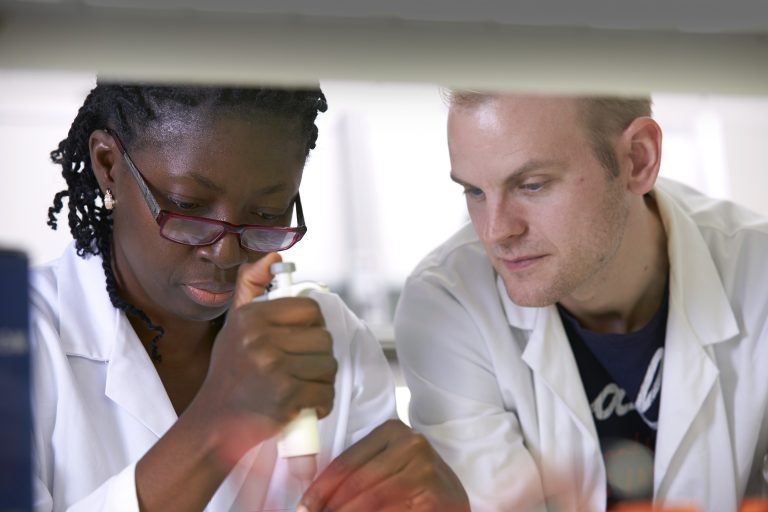
Tertiary education is indeed a big investment, so looking for the right university takes time, patience, and dedication. In case you hadn’t noticed, most universities tend to highlight research as one of their most distinguished and competitive strengths. But the question here is why?
From an individual point of view, the advantages of research extend beyond having an impressive degree certificate. Through detailed research, students develop critical thinking expertise, as well as effective analytical, research, and communication skills that are globally sought-after and incredibly beneficial. Ultimately, research is essential to economic and social development of our globalised society, forming the foundations governmental policies around the world.
“Knowledge generated by research is the basis of sustainable development, which requires that knowledge be placed at the service of development, be converted into applications, and be shared to ensure widespread benefits,” says Mary-Louise Kearney, Director of the UNESCO Forum on Higher Education, Research and Knowledge.

One institution which understands this is the University of Skovde. Though the university is actually much younger than most, its education and internationally-competitive research are highly respected, particularly within the School of Bioscience. The university has a well-developed collaboration between education, research, the business community, and society on both a national and international level.
The school has three divisions: – The Division for Bioinformatics and Ecology, The Division for Cognitive Neuroscience and Philosophy, and The Division for Molecular Biology; offering a total of 13 academic programs at the undergraduate and advanced levels. Besides providing an impressive array of courses, the school has its own research centre known as the Systems Biology Research Center, where research is conducted in the following areas:- Infection Biology, Bioinformatics, Biotechnology, Cognitive Neuroscience and Philosophy and Ecological Modeling. Here are some examples of what Skovde’s experienced research teams have been working on:

Infection Biology
Research from the Infection Biology Group focuses on the development of mathematical and statistical models as well as experimental methodology used to help understand the complex systems that make up infection biology. The Group’s current funded projects focus on:
- Identifying new biomarkers to help diagnose sepsis patients at an early stage
- Identifying biomarker profiles for immunosuppressive drugs
- Developing new methods for the detection of plant pathogens
Bioinformatics
Formed by computer science researchers, this area of investigation focuses on the development and application of algorithms for the analysis of biological data. Skovde’s research has incorporated the development of algorithms, software and databases, as well as solving biological research problems with these tools. As part of the research team, students get to work with other researchers such as stem cell and tumour biologists from other groups within the university , industrial partners and other establishments.
Cognitive neuroscience and philosophy
Research in cognitive neuroscience seeks to increase knowledge and understanding of human abilities, reflected in the form of cerebral activity. One of the main goals of the research is to increase our understanding of human consciousness, as well as to study methods that might increase human wellbeing.

Biotechnology
Defined as the application of biological organisms, systems, or processes by various industries, stakeholders and researchers, Biotechnology encompasses science and life, improving the value of materials and organisms through pharmaceuticals, crops, livestock and the environment. While research in plant biotechnology seeks to identify specific genes to eliminate various forms of arsenic contamination, Skovde’s research projects in microbial biotechnology can also be used to develop microbial bioreactors. The mussel research project that is run together with ecologists includes development of molecular markers that will enable scientists to identify different mussel species.
Skovde’s high-impact research also extends far beyond the laboratory, where the school collaborates with Life Science companies, public organisations and other universities to strengthen its research. Through these partnerships, the school has access to specific expertise, highly advanced laboratories and equipment, as well as PhD studies.
Additionally, the university works with business partners like AstraZeneca, Abbott Diagnostics AB and EnviroPlanning to teach industrial PhD students, and also conduct research in the interest of the company. Students who register for an industrial PhD will be employed by these companies, and receive PhD training at the School of Bioscience – a great career experience that enhances their CV tremendously.
In short, studying at a university with a reputable research foundation not only gives you a firm platform on which you can continue learning, but the skills you master also provide a real advantage over others in the real-world.
Click here to view Skovde’s recent research publications
Follow University of Skovde on Facebook and YouTube
All images courtesy of University of Skovde
Liked this? Then you’ll love these…
The phenomenal growth of Life Sciences in emerging markets
The role of university research in tackling social challenges and driving economic growth







